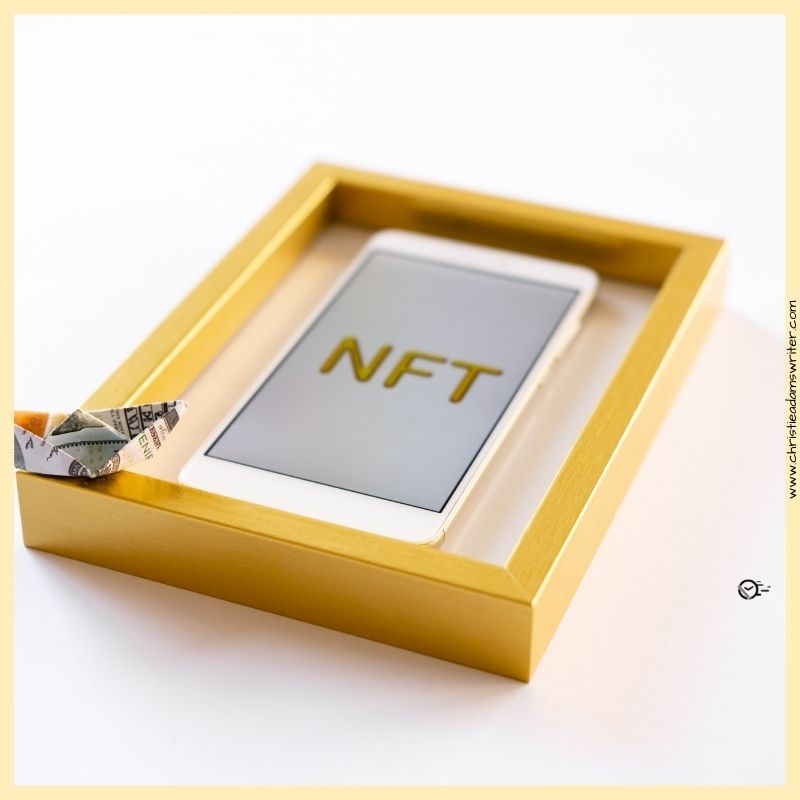NFTs, non-fungible tokens.
You’ve seen the headlines. Heard they are massively damaging to the planet. Know they are full of scammers. You aren’t going to learn about them. They’ll soon disappear again. Or maybe it’s just too full of jargon and you’ll wait until it all goes mainstream. Then maybe, or not, you’ll get invested in time or money. Sorry, but that’s not good enough.
What the heck does fungible even mean?
Surprisingly, it goes back to Latin, and it is basically something you can exchange for something of equal value, like a pound note or dollar bill for a coffee (OK, optimistic, but you get the idea.) So non-fungible is, you guessed it, unique and non-exchangeable.
What is an NFT?
It’s unique. Think of it as a virtual trading card. It could be a piece of art, a book, a ticket for a show. In fact, I should say they are all of these things. Artists and musicians are using them, writers are catching on. Gary V has even made his doodles a virtual ticket for an event. He made $90m so guess he got that right.
Importantly, he learned about them first. Committed time and effort to learn and, for him, it paid off. Of course, he’s an outlier, but there’s nothing stopping you from learning too. That’s all I ask. He also says most NFTs will fail, so this guy is worth listening to.

Outliers
The headlines as always focus on outliers, the good and the bad. The wonderful Beeple who sold his NFT for $69million, through to the NFTs are a scam. I’ve not quoted a reference here because there are so many, but most of the publications I found weren’t worthy of sharing as they weren’t balanced articles. It’s easy to find one in your local friendly search engine of choice.
Ebooks versus VHS
Which personality are you, an ‘early adopter’ or a ‘head in the sand and wait until it hits you in the butt?’
Did you think ebooks would mean the end of books, TV would mean the end of movies? Do you still watch movies and read books?
I’m an Eco Advocate
Of course, right now NFTs can be damaging. They use servers but before you shout ‘told you so’ think about it.
When did you last fly or drive? Do you use email? When did you last clear out your email junk and trash bins?
Be honest, when did you last plant a tree or two?
‘A typical office worker sends and receives around 140 emails per day, which, over the course of a year, creates as much CO2 as flying from London to Bruges or watching 955 movies.’
‘The HuffPost founder and Thrive Global CEO, Arianna Huffington, has implemented a software that deletes any incoming email when one of her employees is away, with senders being told to resend their note at a later time if it’s truly urgent.’
Sending 65 emails is roughly equivalent to driving 1km in a car. In a year, an average person in the developed world adds 136kg of CO2 to their carbon footprint from the emails they send and receive. This is equivalent to an extra 320km driven in a car. Globally, the world’s email usage generates as much CO2 as having an extra seven million cars on the roads.
Not all NFTs are made equal
It’s not all that easy to write off NFTs when you think about it. Certainly, two wrongs don’t make a right. Who will hold NFT suppliers and providers to account if those who are eco-aware just refuse to even discuss them? They are here, they exist, right now. I want to mint one this year. But first I’m learning, as you should.
In South Africa, environmentalism is an unquestioned article of faith among many artists.
One collective called The Tree created a platform for artists to sell NFTs, and then collaborate with a Cape Town charity called Greenpop to plant trees to offset the carbon emited from the crypto-art sales.
Read Past the Headlines
I read so many posts about NFTS and I can almost guarantee that everyone has at least one comment about ‘I’m not going near them. They damage the planet’ and of course ‘They’re just a scam and encourage theft of intellectual property.’ Well, both may be true. So isn’t that a fantastic reason to learn about the hows and whys? What if it’s not true, or only partially accurate?
Recommended Reading
Education
Let me make it clear I’m not here to support NFTs or diss them, just to ask you to get educated. You know I am passionate about education. I believe it is possible to solve almost any problem, any size, by getting educated. Learning is a daily, lifelong initiative we must all keep up with.
Just because you don’t like the sound of something doesn’t mean you shouldn’t learn about it. If something sounds scary, damaging or too technical, it’s even more reason you should learn about it. You can’t trust the experts to look out for you. That’s on you. It’s up to us to hold others in power, business, and NFTs accountable.
What are you doing to learn about something that could change the publishing industry forever, and put more money in your wallet, be it real or virtual?

